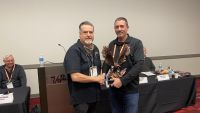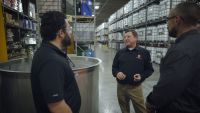Contractor to Contractor: Tectonic Systems, Inc.
By Masonry
Linn Thomas - Tectonic Systems, Inc., Indianapolis, Ind.
Anyone who knows or has spoken to him would agree that "enthusiasm for the trade" would be one of the many fair characterizations for Linn Thomas, Owner of Tectonic Systems, Inc. It's the least you can say about someone who has designed a monorail system out of I-beams to get a job completed when others wouldn't have bid the job to begin with. We were able to speak with Thomas about the hard work that he's done in the past and present, his business style and his strong belief in the strength of the masonry industry.
Masonry: What do you think has been the key to Tectonic's growth and success over the years?
Thomas: I believe that my faith in and dependence on God to direct my business would be key to our success.
Secondary would be our goal of consistently combining excellent customer service with exceptional workmanship. We work very hard not only to complete quality work on projects, but also to have quality relationships with the architects, owners, general contractors and the other trades.
Masonry: Linn, you started out your career with Turner Construction. How did working and learning the trade with this large company help you with your own business now?
Thomas: It gave me the opportunity to learn to manage large projects. In particular, how to coordinate with other trades, how to manage materials and equipment on a project, as well as how to position and manage the labor to realize the best production potential. In the office, I learned to take-off plans and estimate job costs.
I learned by working with a variety of people in the masonry industry who were generous with their knowledge, patient with my mistakes, and most of all, willing to give me a chance. Although, I will say that I had to show ability, initiative, enthusiasm and be willing to accept instruction. If I see those qualities in someone else, I will also be willing to do the same for them.
Masonry: Tectonic has worked on masonry projects across the U.S. What are some things you have learned over the years from being a traveling mason contractor?
Thomas: If you learn your trade and become a craftsman, you can work anywhere. Good brickwork doesn't change from region to region, but every job is different. Every project presents a new set of people and circumstances from which to learn and has something to teach, even if it's a lesson you don't want to repeat.
Masonry: Many of your current projects incorporate several different types of masonry, such as varieties of brick, block, stone and cast stone materials. Do you think that owners and architects are starting to realize the different masonry materials available and being more creative with them?
Thomas: Yes, I think the manufacturers and suppliers are marketing their products more aggressively, and more owners and architects are realizing how combining materials can enhance their projects. I think we are going to see architects become increasingly more creative with the variety of masonry materials available to them.
Masonry: Looking back over the years, what was your most difficult masonry project and how did you overcome the obstacles?
Thomas: One of the most difficult projects was Proctor & Gamble in Cincinnati, Ohio. The challenge for this project was logistical. We were building laboratories designed for cut limestone panels on a site that had no space for a crane and on a very rigid schedule. I designed a monorail system and had it fabricated at a local machine shop out of I-beams and trolley wheels to move the 2,000-pound panels to a hoist for erection. Despite these challenges, we brought the job in on budget and on schedule.
Masonry: What is the best advice you would give a budding mason contractor?
Thomas: I absolutely believe that the job begins on the planning table. Make sure your numbers are right. If you haven't estimated the project accurately, you can be behind before you get started, and if that happens it will be very difficult, if not impossible, to make up the difference, even with good production.
Masonry: What do you feel is the biggest misconception about the masonry industry?
Thomas: I think one of the biggest misconceptions I see is that people don't realize that masonry is a skilled trade. It is a craft that takes much time and effort and talent to learn. If I run an ad in the newspaper for brick masons, about 75% to 80% of the responses will come from people who have no knowledge of brickwork, but feel like they could probably do it.
Masonry: What would you do to change that misconception?
Thomas: Education. I think that promoting vocational training at the high school level is a good place to start. I also believe that individual mason contractors should have their own training programs for those who want to work and learn to master the trade.
If we placed a value on skilled craftsmen, then we owe it not only to ourselves, but our industry, to help train them.
Masonry: What are your three biggest concerns in keeping your company successful?
Thomas: Maintaining my crews and training new people will be key to our success in the future. We have to be able to combine productivity with quality work.
Also, making sure I choose our projects wisely ? profitability is key to success.
Last, but certainly not least, maintaining my relationship with my banker. Having a banker who understands my company and my industry allows me greater freedom in choosing my projects.
Masonry: What do you feel is the industry's biggest challenge in the near future?
Thomas: Labor. Finding people who want to learn the masonry trade is not an easy task; even harder is finding people who want to excel in this trade.
Masonry: Where do you think the masonry industry is going to be 10 years from now?
Thomas: I'm very optimistic. I think we will see a real growth in the masonry industry. The large variety of materials available for use allows for more creativity and flexibility in designing masonry projects.
Masonry: What do you think will be the masonry industry's biggest competitor in 10 years?
Thomas: I think that the tilt-up wall industry will be our biggest competitor. It takes less time and in most cases is more cost-effective, although masonry designs are getting increasingly better.
I think masonry will always have a market with those looking for durability and aesthetics in design for their projects, though.
Masonry: What do you feel are the most critical issues you'll face with future government regulations?
Thomas: I think OSHA regulation is a critical issue. OSHA regulations impact all of us in construction, but I think our industry should be proactively working with OSHA to resolve safety issues within our trade. We want our people and our job sites to be safe, as well as productive.
Masonry: Which group do you feel has the bigger impact on masonry's future: architects, engineers or general contractors?
Thomas: I would have to say architects. They design the projects and choose the materials. I believe the durability of masonry combined with the flexibility of design that some of the new materials afford makes masonry a favorite choice for architects.
Masonry: What do you like most about being a member of MCAA?
Thomas: I enjoy the access to information about what is going on in the industry, everything from new tools and equipment, to the problems and solutions of other contractors, and the opportunity to network.
About the Author
Masonry, the official publication of the Mason Contractors Association of America, covers every aspect of the mason contractor profession - equipment and techniques, building codes and standards, business planning, promoting your business, legal issues and more. Read or subscribe to Masonry magazine at www.masonrymagazine.com.


















